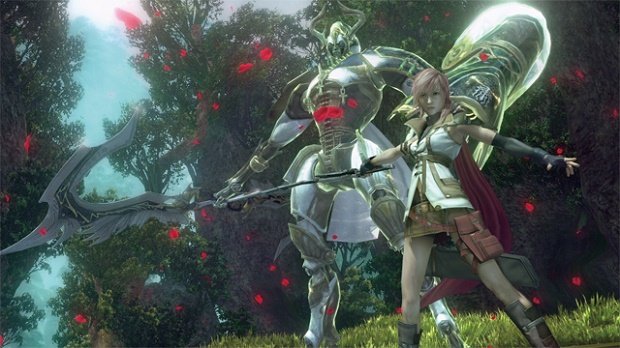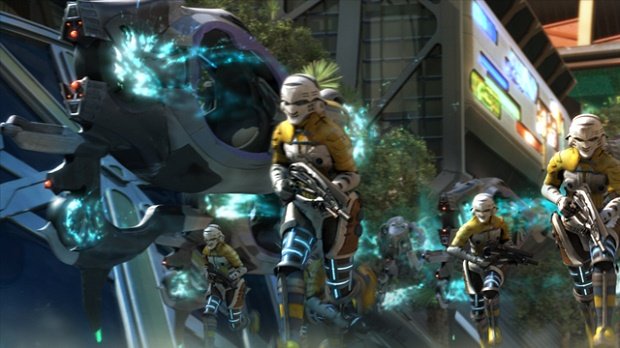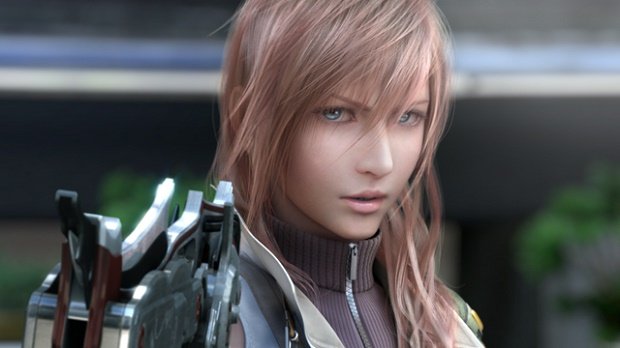Final Fantasy 13 is the Fury Road of the series
The nicest thing about the winter gaming season lull is having time to revisit games I otherwise wouldn't have time to dive back into. This year, it's Final Fantasy 13. The last time I played it was at launch, back in 2010. I made it to chapter 11 - the moment when the game finally loosens its grip and gives you freedom to explore the world of Pulse - and bailed.
I was riding the FF13 hate train along with everyone else, and I ran out of steam 30 hours into the game. It's too linear. Where are the towns? What's with all the tutorials? and so on. So now, nearly six years later, I wanted to give it another chance, apart from the hype, the heaps of expectations I and many others had piled on ever since Final Fantasy 12 launched four years prior. And as I was playing it again, I realized something that changed my whole perspective on the game: Final Fantasy 13 is the Mad Max: Fury Road of the series.

Now that you're done flipping tables and chairs over (please return them to where you found them when you're through), realize that I'm not saying Final Fantasy 13 is as good as that cinematic triumph. It's still a deeply flawed game that sometimes feels like its art was given far more precedence than its design, whose characters are clumsily written and don't really come into their own until a few dozen hours in. I'm just saying that its linearity and limited focus isn't one of its problems, because it ties into the very core of what Final Fantasy 13 is: an extended, high-speed chase sequence through the high-tech floating continent of Cocoon.
If Mad Max: Fury Road were a video game, it'd be just as linear as Final Fantasy 13. In the film, Max and Furiosa speed down a dusty road, away from Immortan Joe and his cadre of War Boys, meet up with a few people, and turn around and go back the way they came. That doesn't make it any less engaging; on the contrary, its singular focus means that it has the space to concentrate on a small group of characters and develop them through their actions rather than piling on exposition or spinning wheels with unnecessary detours. Final Fantasy 13 takes a similar approach, and for a genre as typically sprawling and free-form role-playing games, this is actually a highly controversial decision, but it's a decision that makes a lot of sense for the story that it wants to tell.
Final Fantasy 13 opens as Lightning carries out an attack on a train carrying a group of citizens on their way to being Purged - excommunicated for merely existing in a town that came into contact with a mysterious artifact from Pulse, the wild lands that exist below Cocoon. From there, we're introduced to a cast of colorful characters - some who want to fight the government's authoritarian grip on the people, others who find themselves victims of circumstance - as well as a ridiculous amount of terminology familiar to those who live on Cocoon but are completely alien to the player.

Fal'Cie: godlike beings that power much of Pulse and Cocoon's technology, but have a tendency to 'mark' people, forcing them to carry out their will. L'Cie: people marked by fal'Cie, granted magic powers, and forced to carry out a 'focus' - completing it will grant them immortality (as a giant crystal), failing turns them into a monster-like being called a Cie'th. But none of this matters right now, because you have to run, run away from the PSICOM and Guardian Corps troops that want nothing more than to terminate you. In Cocoon, l'Cie are basically seen as terrorists, and unfortunately, you and your whole crew have been marked by the gods.
And so you run. You run through a lake transformed into sweeping crystallized glaciers. You run through a junkyard. You run through a forest, ancient ruins, the cities of Palumpolum and Nautilus, all while Sanctum troops breathe down your neck. Like Fury Road, it's a bit difficult to stop for things like character development and an explanation of everyone's complex backstories when you have an entire military complex barrelling toward you at full speed. Instead, Final Fantasy 13 is more keen to get you acclimated to its characters by watching how they interact with one another, how they handle the stress of their new designation as public enemy number one, with occasional flashbacks interspersed throughout to provide new context.
Weekly digests, tales from the communities you love, and more
Its structure is actually not all that different from Final Fantasy 10, all things considered, and yet FF10 is largely considered a modern classic. Both are incredibly linear, almost to a fault, as Tidus and Lightning make a beeline toward their objectives, until their respective games finally open up a bit around 30 hours in, granting the player a little more freedom in where they can go.

The biggest difference is one of pacing. There's a big, bad, world-destroying monster you're trying to defeat in FFX, but you're not really being hunted by anyone, so you have time to take a load off when you hit a new town and get to know its people. With a significant amount of downtime between story beats, there's more opportunity to shop or play blitzball. Meanwhile, trying to do something similar in Final Fantasy 13 wouldn't make any sense. Sanctum troops are always nipping at your heels, and Cocoon's citizens are inundated with wanted posters and warnings of your imminent arrival. If you wandered into an item shop looking for hi-potions, the store's owner would hit the silent alarm so fast, you'd be surrounded by the military before you even had a chance to react.
So instead, Final Fantasy 13 focuses on running your team through a gauntlet of exciting locales and deadly creatures, and provides you with a deceptively rewarding combat system. Like its plot, FF13's combat is all about forward momentum, and is more about learning what your enemies are capable of and reacting accordingly than bogging down in the menu-based minutiae typical of the genre. You control your team at a macro level, switching classes on the fly in order to react to an ever-shifting battlefield. Combat is over nearly as quickly as it starts, which keeps the pace brisk, a direct analog to the game's own plot: plow through your opposition, and never stop moving forward.
It's a jarring transition for the series, especially coming off of the wide, MMO-sized spaces of Final Fantasy 12, or the more nuanced pacing of the Final Fantasy games of the previous twenty years. But Final Fantasy is a series that's constantly attempting to reinvent itself, and for its thirteenth entry, it wanted to be a high-octane, edge-of-your-seat thrill ride rather than a more introspective and methodical tale. Rather than hate on it for being something it's not, we should at least try to give it an honest shot for what it is - and if you come to it with an open mind, I think you'll be pleasantly surprised.



